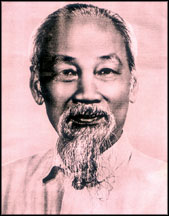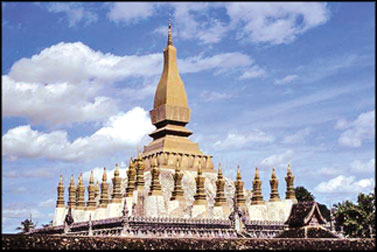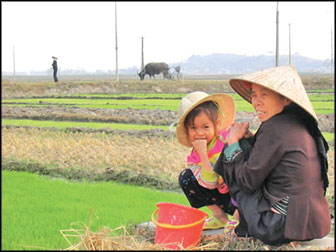Vietnam: Sri Lanka’s religious, cultural and political friend
Richard BASNAYAKE
 |
|
Ho Chi Minh |
The 64th National Day of the Socialist Republic of Vietnam falls on
September 2, 2009. The Democratic Republic of Vietnam (North Vietnam)
was formed on September 2, 1945 after the victorious struggle against
the French imperialists, led by Ho chi Minh. The Socialist Republic of
Vietnam was formed in 1975 after a long drawn war of liberation against
the aggressions of France, the United States and Japan, and the
subsequent unification of North and South Vietnam.
Geography and climate
On the map, Vietnam is shaped like “S”, situated on the eastern side
of Indochina, in South-East Asia. It is stretched in the tropical zone,
and covers over 3,000 km of coastline overlooking the Eastern Sea and
the Pacific Ocean. It borders China in the North and Laos and Cambodia
in the West, North Vietnam has large plains, sprawling in the basins of
the Red the Lo and the Chay rivers; and has four distinct seasons with
high humidity. Over thousands of years the people of North have built a
system of dykes along the river banks, to cultivate land and earn their
living. In South Vietnam, the great Mekong river has created a fertile
plain which is considered the largest granary of the country. There are
two seasons: rainy and dry.
Demography
The population of Vietnam exceeds 80 million and is made up of 54
ethnic groups. The largest group is the Viet or Kinh, accounting to
about 80 percent of the entire population. They live mostly in the
lowlands, while the other minority groups live in the highlands and in
hilly areas.
Religion
There is no official religion in Vietnam, but Buddhism is more
popular and people observe it diligently. Besides, most Vietnamese
worship their ancestors. There are ‘religions, more specific to the
southern parts of the country such as Caodai Sect, the Hoa Hao sect and
Catholics. Buddhist pagodas and Catholic Churches are interesting
tourist attractions.
Culture
 |
|
A temple in
Vietnam |
The Vietnamese culture endowed with a long and rich heritage is
deeply stamped with national pride. Vietnam has its language and
writing. The national identity is made up of 54 ethnic minorities living
together as one nation.
This unity in diversity has produced a lot of traditional arts which
have been developing for thousands of years. Specific features of
Vietnam are reflected in other cultural activities such as legends,
festivals, traditional theatre - very specially - water puppetry, music
dance and customs in weddings and funerals. the habit of chewing betel
with areca and lime is also a tradition.
Fruits and vegetables
Vietnam counts over 130 species of fruits. The tropical zone trees
produce bananas, mangoes, papayas, oranges, avacadoes, grapes and
coconuts while the temperate zone trees produce, apples, pears, apricot,
plums and peaches. Vegetables such as carrots, beetroot, cabbage, beans,
pumpkins, and all other vegetables in wet and dry zones of Sri Lanka are
grown extensively.
Economy
Vietnam is basically an agricultural country. Rice is the main crop
and Vietnam is the second largest exporter of rice in the world. The
other crops are potatoes, manioc and soya beans. From 1980 to 1985, the
economy of Vietnam experienced a serious crisis.
To face this situation, the Communist Party of Vietnam, in 1986,
defined the “Doi Moi” politic, which marked the historical turning point
in the edification and developing process of the country.
After more than 15 years of economic reforms, Vietnam has achieved
major successes and significant improvements. Emphasis was put on
scientific activities and productions were readjusted to fit the new
model of economy, controlled by the State with Socialist Orientation.
One of the contributing factors to the economic development in recent
years was the law on Foreign Investment. Vietnam is now carrying out an
open-door - policy to join the international market and become an
industrialized and modernized country before 2020.
Vietnamese diplomacy: It is believed that the Vietnamese contemporary
diplomacy continues and creatively applies its ancestors’ diplomatic
genius with the age - old traditions of the East and the experience
drawn from the Western Diplomacy has created its own specific
philosophy. Its primary objective is to contribute to the defence of
national independence and, at the same time to expand the friendship
with other nations. Over the past 60 years, Vietnam has established
diplomatic relations with 165 nations and trade ties with over 100
countries.
There is a popular phrase in the Vietnamese diplomatic strategy which
sounds unfamiliar to Western diplomats - “People’s Diplomacy” - “Taking
the people as the centre of concern” - is a common concept in the East.
It means that not only the ruling-class but also different strata of
people conduct international interchange. Vietnam is implementing an
open diversified multi-sided diplomatic policy in conformity with the
motto: “Vietnam wishes to befriend all nations of the world for the sake
of peace, independence and development.” In this framework, Vietnam has
become a member of ASEAN (July 1995) and APEC, and also has expanded
relations with countries in Asia, Africa and Latin America.
In recent years, leaders of the Vietnam’s Communist Party, National
Assembly and Government paid official visits to many nations in the
Pacific, Asia, Middle-East and Africa. Vietnam received many Heads of
States, Prime Ministers, (Sri Lankan Prime Minister paid an official
visit to Vietnam) and other high-ranking officials and delegations from
all over the world.
 |
|
The rural
Vietnam |
Vietnam is also an active member of the Non-Aligned Movement and a
member of the United Nations.
Trusted friend of Sri Lanka
When Vietnam’s Deputy Foreign Minister Dao Viet, visited Sri Lanka in
early August to sign the bilateral trade agreement amounting to US $ 70
million, Foreign Minister Rohitha Bogollagama, said Sri Lanka and
Vietnam had entered into an agreement to expand trade and political
relations between the two countries and the first agreement was signed
in 2003, the second on 10th August in Sri Lanka and the third in 2011 in
Vietnam.
He said a Vietnamese Embassy will be opened in Colombo soon to boost
trade, investment, food, security and political relations for the mutal
benefit. He also conveyed the appreciation of the Government and the
people of Sri Lanka for the active role played by Vietnam in
international fora, particularly in the UN Security Council in
supporting Sri Lanka’s effort to defeat terrorism.
Vietnam’s Deputy Foreign Minister said Vietnam is always ready to
support Sri Lanka’s developments and assist its people in their effort
to maintain peace and stability in the country and the international
campaign against terrorism.
The writer is Secretary, Sri Lanka Vietnam Friendship League |



